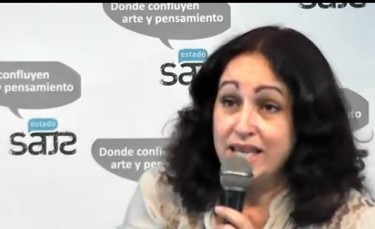Over the last few weeks, state media in Cuba have alleged that the independent scholarly forum, Estado de SATS (State of SATS), is supported by United States government agencies that wish to subvert the Cuban government.
Since 2010, Cuban physicist and intellectual Antonio Rodiles has organized Estado de SATS, a series of panel discussions open to the public. His website [es] describes the forum as a “pluralistic space for debate and participation that is mediated by open and frank exchange.”
Participants have included Cuban artists, independent writers and bloggers, and scholars as well as foreign researchers and diplomats resident on the island. Rodiles reported [es] that when the group met on March 3, 2012, to discuss the value of international academic and cultural exchange, state police surrounded his home as participants departed. State media outlets have published several articles condemning the project.
Meeting panelists included journalist Julio Alega Pesant, Voces Cubanas blogger Miriam Celaya, United States Interests Section Representative Charles Barclay, and social scientist Alexis Jardines.
Por el Ojo del Agua [es] author Rebeca Monzó, who attended the event, wrote that the “most polemical” issue in discussion was that of exchange between the US and Cuba, and the dearth of Cuban-American participants in such exchanges:
[L]os que vienen a través del mismo son en su inmensa mayoría intelectuales o artistas estadounidenses, no cubanos norteamericanos como más desearíamos nosotros, para que éstos nos expusieran de primera mano sus experiencias en el exilio. ¿Por qué Silvio puede ir a cantar en EEUU y sin embargo Willy Chirino no puede venir a hacerlo aquí en la tierra que le vio nacer?
While part of the discussion focused on the travel ban that US residents face, panelists also criticized travel restrictions on the Cuban side. One panelist spoke of Dr. Jeovany Jiménez, who had been banned from traveling on medical missions because he is outspoken in his views against the government. Here is the video of one of the conferences (in Spanish):
In an article posted just hours after the meeting had adjourned, Iroel Sánchez [es] described the meeting as a “discussion of support that the US provides to groups working for regime change on the island.”
Sánchez also noted that Yoani Sánchez [es] attended the event, reminding readers of the blogger’s alleged (though unconfirmed) support from US government agencies.
El Diario de Cuba, [es] an independent Cuban news site, offered additional coverage of police actions after the event. Police reportedly asked for attendee’s government ID numbers, but nothing more.
In response to police intimidation, and attacks from Iroel Sánchez, Cubadebate, and other state-supported media, Rodiles called state security’s efforts to discredit the group evidence of “its inability to come to a public debate of arguments and ideas.”
In a second post on the Estado de SATS blog, [es] [English here] he wrote:
¿Por qué la negativa y el temor a que los cubanos discutamos sobre nuestra realidad y en especial sobre un tema tan importante?
[…]
La sociedad civil cubana se encuentra en un período de resurgimiento, lo que nos obliga no sólo a ejercer nuestros derechos, sino también a hacerlo con el mayor rigor posible.
[…]
El reclamo de la sociedad civil, de jugar el papel que genuinamente le corresponde, irrita grandemente al poder, sobre todo si consideramos que desde hace 53 años el mismo grupo de individuos ha asumido el monopolio absoluto de la palabra, de los rostros, de la lógica y sobre todo, asume que el poder de la fuerza le asiste para impedir a cualquier precio que los cubanos demanden otra opción de gobierno.
[…]
Cuban civil society is in a period of resurgence that obliges us not only to exercise our rights, but also to do so with the greatest possible rigor.
[…]
Civil society’s demand to play the role genuinely belonging to it, greatly irritates the powers-that-be, especially considering that for 53 years the same group of individuals has assumed absolute monopoly over words, faces, and logic and, above all, counts on the power of force to prevent, at any price, Cubans from demanding another choice of government.
Since the start of the project, Rodiles has stated that a central objective of the group is to “re-think” Cuba through social science inquiry and debate. Rodiles is openly critical of the Cuban system, but he has rejected accusations that the group accepts financial support from the United States. Nevertheless, state media interpreted U.S. Interests Section representative Charles Barclay’s attendance at the meeting as evidence to the contrary.
Estado de SATS has come into a familiar paradigm, in which any association with US authorities, however large or small, can render one a “gusano” or “worm” in the eyes of the Cuban state. Regardless of whether Rodiles’ group receives help from off-island sources, it is true that USAID (United States Agency for International Development) and other US government agencies often seek to support groups of this nature, and some accept this help, along with the complex political implications that it carries. Journalist and researcher Tracey Eaton has conducted scores of interviews with Cubans who have received such funds, many of which shed valuable light on the subject.
In a November post commenting on similar accusations made against arts presenter Grupo Matraka, blogger and Global Voices author Elaine Díaz noted [es] that regardless of funding sources, such groups usually have a defined goal and purpose that is not simply to overthrow the government. While groups like Estado de SATS may want regime change, their goal is not to affect this change, but rather to use their knowledge as cultural critics and social scientists to consider how it will take shape in the future. Such groups may not be acting “within the revolution,” but, Díaz points out, they are still “real people.”








6 comments